Editor’s Note: The DBizInstitute is excited to share this article, written by Dr. Setrag Khoshafian, with our community and in advance of his new book release. Keep an eye on our website as we share additional articles in the coming months written by Setrag, as well as a pending Meet the Author webcast to discuss his new book ‘How to Alleviate Digital Transformation Debt’ expected to air Fall 2021. This article was originally published on CognitiveWorld.com on January 30, 2021.
This is the 10th and final installment in the article series on Digital Transformation Debt post-Covid-19. It is the fitting conclusion for enterprises that face the transformational challenges of Covid-19.
The nine previous articles highlighted these key topics as they relate to Digital Transformation Debt post-Covid-19:
1. Culture
2. Operational Excellence and VSaaS
3. Automation
7. Customer Experience Optimization
9. Blockchain Decentralization
We now come to the climax of Digital Transformation Debt – especially in the Covid-19 era: Competency Centers (aka Centers of Excellence (CoE)). Given the many complex digitization trends, a recommendation for a competency center, with a connotation of controlling and centralized, sounds contradictory! Doesn’t it run against the very core and grain of Digital Transformation?
We started the series with Culture. The various dimensions of the post-Covid-19 Culture included Connectivity through Virtualization, Flattening of the Organization for Empowerment, and Servant Leadership. Operational Excellence (Part 2) and Automation (Part 3) addressed the very pragmatic requirement for lean practices to alleviate Digital Transformation Debt through digital technologies.
“Digital Transformation requires changes to processes and thinking—changes that span your internal organizational silos. The clear delineation between technical skills and leadership skills is blurring fast.” Leading Digital
In the post-Covid-19 era alleviating Digital Transformation debt means breaking the silos and divisions within the organization and across organizational boundaries. The blurring of technical and business skills reflects the emergence of Citizen Developers (Part 4) and Citizen Data Scientists (Part 5).
The Tug of War between Fast Innovation and Best Practices
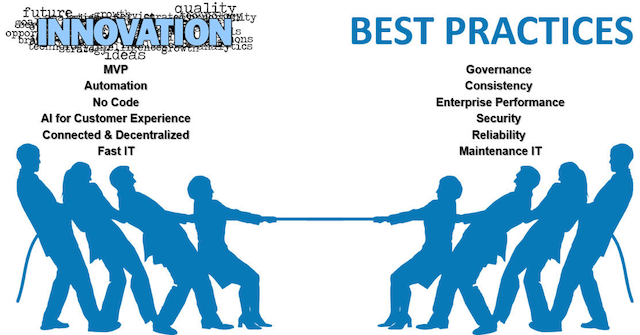
Part 6 focused on Design Thinking and Innovation. As organizations try to leverage digitization, especially for Customer Experience Optimization (Part 7) in an increasingly connected (Part 8) and decentralized (Part 9) world, they are often faced with a healthy tension between two compelling approaches:
- Digital Innovation Speed: Accelerated and expressed digital application development for automation.
- Digital Competency Best practices: Enablement, methodologies, governance, and re-use to optimize the delivery of work automation solutions.
Often organizations pursue the next digital technology “shining object” without considering the competency perspective—which is critical for success. New platforms and capabilities for Citizen Developers and Citizen Data Scientists are powerful and impressive. However, there is a tension between “hacking” quickly with Minimum Viable Products versus best practices for security, performance, reliability, and sustainable maintenance. As startups and enterprises attempt to accelerate their innovative initiatives in the post-Covid-19 age, it becomes even more critical to take a closer look at the core competency center enablement.
Keeping the healthy tension and balance between speed and best practices is precisely the sweep-spot of Digital Transformation Competency Centers. There are other dangers if an innovative startup or enterprise refuses to establish and empower a competency center – as discussed in the next section.
Why Competency Centers?
In the post-Covid-19 age of decentralization, a centralized governance body could limit and even suffocate innovation with unnecessary micro-management, governance, or even bureaucracy for approvals. However, organizations that have ignored or diminished Competency Centers have often paid a heavy price. It could even be an existential challenge – especially when it comes to security, reliability, and governed response to customers and market trends.
Digital Transformation (DX) Competency Centers (CC) need to balance DX Strategy with pragmatic Execution Best Practices – that addresses the prioritizations and objectives of the DX Strategy.
What happens if the organizations ignore or de-emphasize the DX CC?
- Given the proliferation of No Code tools, there is the danger of ad-hoc deployments with potential security, reliability, and performance vulnerabilities.
- Automation tools, especially Robotic Process Automation, can automate non-optimized processes. The maintenance of automation could become a nightmare.
- Waste and inefficiencies due to lack of guidance and best practice policies.
- Inconsistent performance of siloed organizations – each doing what they see best.
- Considerable waste in replicated solutions which are unnecessary: no sharing of knowledge, best practices, and re-use.
These problems could ensue when no competency center enables, governs, automates, and architects the organizational best practices across various silos or departments.
Competency Center Responsibilities and Focus
The post-Covid-19 Digital Transformation Competency Center (DX CC) covers four key areas:
1. Enablement and Training: The emergence of Low Code/No Code platforms and Artificial Intelligence Machine Learning capabilities could be overwhelming. The Citizen Developers and Data Scientists need to be trained and enabled on the selected platforms for innovation, always responsive to customer and market trends. The DX CC is involved in choosing the best tools and platforms for Low Code/No Code and AI/ML. The DX CC trains, educates, and enables this new harvest of Citizen innovators – continuously.
2. Governing Design Thinking and Design Sprint: The best practices involving continuous improvement and prioritization of Project selection, design review, and expert services:
- Design Thinking: This is the overarching methodology that should be platform or technology-agnostic: select, implement, and deploy the MVP that corresponds to the low hanging fruit prioritization: Do it now!
- Design Sprint: This 5-day Design Sprint approach at the tail of Design Thinking Methodology aligns and realizes the Prototyping and Evaluation phases: corresponding especially to Prototyping and Validation in a Design sprint.
- Low Code/No Code Platform Selection: There are now hundreds of Low Code/No Code platforms with a range of capabilities and pricing. The Competency Center will analyze and recommend a combination of Low Code/No Code platforms relevant to specific categories of applications.
- Minimum Viable Product (MVP) Implementation and Deployment: This is the ultimate objective of Design Thinking – and the beginning of the iterations for continuous improvement and market penetration. Agile methodologies are aligned to the selected platform and capabilities – with continuous iterations.
3. Governing Automation Best Practices: The governance for the adoption of automation best practices, methodologies, and guardrails to guide the DX innovation initiatives of the organization. Automation spans repetitive, AI-assisted, and cognitive. As discussed in Part 3, Covid-19 has accentuated AI-assisted work. Most organizations reduced customer service staffing during Covid-19. Organizations are increasingly relying on bots that often make the initial identification of customer issues and then involve an agent. More importantly, advanced customer service technologies are assisting the customer service representatives. Often the software robots automate the manual interactions of existing legacy systems. There should be best practice guidelines for maintaining or replacing these systems: the corresponding impact on the automation. The DX CC provides the best practices, enablement, tooling, and overall automation strategy – from mining to action in automated processes.
4. Optimizing the Digital Transformation Architecture: The 10-part series on Digital Transformation Debt clearly illustrates the vast potential and the complexity of digital technologies. The DX CC should also be responsible for the digital enterprise architecture. Part 8 and Part 9 presented the multi-layer architecture. But that is high-level digital enterprise architecture. The comprehensive deployment architecture is much more complicated. It involves components for Cloud deployments, Security, Reliability, Scalability, and DevOps modules for continuous innovation and deployment.
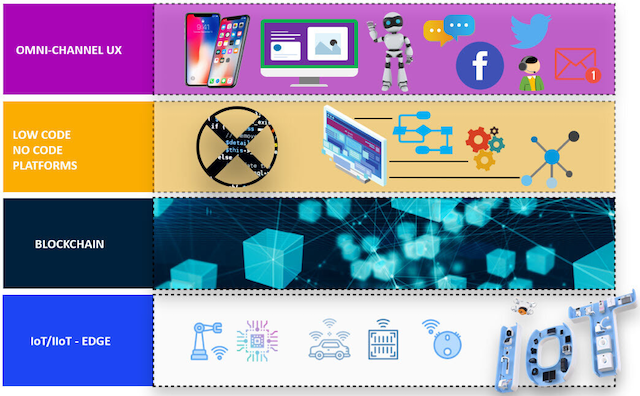
Here are some of the areas covered by DX Architecture best practices:
- Legacy Modernization: With No Code/Low Code Integration Automation platforms and modules
- Cloud Strategy: On-Premises, Cloud, and Hybrid strategies and migration roadmaps
- Microservices: Service-Oriented and Microservice architecture
- API Management
- Artificial Intelligence: AI/ML modules for the DX architecture stack: different layers and components will require different AI algorithms. Deep learning and mining of models from data and harvesting intelligence from cognitive workers are essential components.
- Automation: Tools for Automation strategies and modules
The Competency Center oversees the various methodologies and iterations.
The enterprise or startup Thinks Big, Thinks Digital, and Thinks Transformation – but Starts Small: Iterates and adjusts in continuous innovative iterations.
Governing, Enabling, and Accelerating Iterations
The continuous lifecycle of Digital Transformation involved multiple iterations. The Digital Transformation Competency Center needs to analyze, govern, and enable the iterations for Minimum Viable Products (MVPs) and feature enhancements of existing products or services. As discussed in Part 6, the methodologies involve Design Thinking, Design Sprint, and Low Code/No Code MVPs.
DX CC continuously monitors, iterates, and re-prioritizes various backlogs. Prioritization balances ease of implementation with business value:
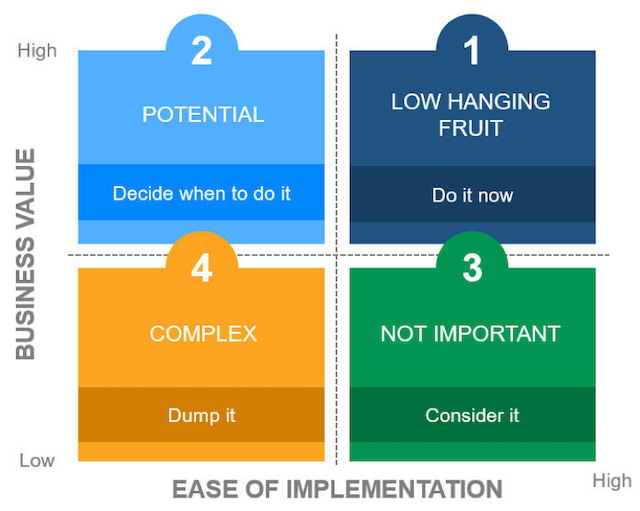
- Business Value: How vital is the innovation project to the business stakeholders? Some KPI measures include increased revenue, operational excellence for cost reduction, regulatory compliance, and customer experience optimization.
- Ease and Complexity: Every innovation project candidate will require integration with systems of record or other emerging technologies such as IoT or Blockchain. There are also other considerations such as UX complexity, scalability, security, and privacy requirements. Each of these impacts the complexities of the implementation.
There are multiple methodologies – with major and minor loops. These methodologies include prioritization through Design Thinking, Design Sprint, Agile methodology for MVP iterations, DevOps, and operational excellence Real-time Six Sigma. Quite complex, iterative, and continuous. The importance of the DX CC to train, improve and govern the lifecycle cannot be overemphasized.
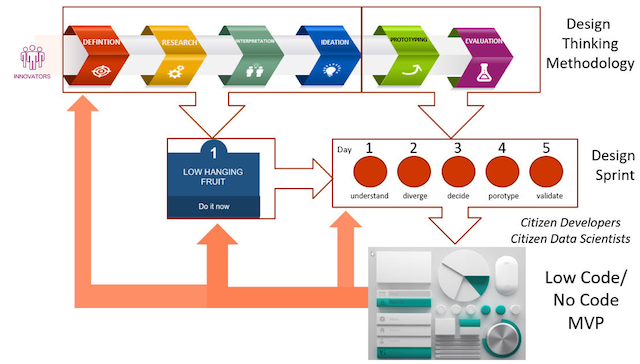
The methodologies, especially for delivery and productization, are iterative at their core. With a methodology such as Scrum, the stakeholders can provide feedback and, in some cases, might even decide to release the current version – sometimes even ahead of schedule – as they might deem it good enough for production. In Scrum you will have a prioritized product backlog—a list of business and technical features that need to be implemented.
Insight to Action Iterations
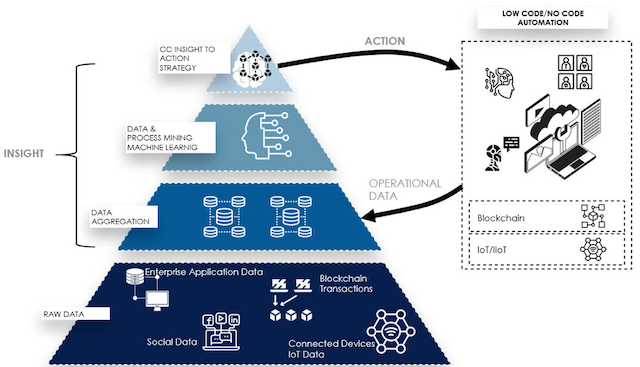
As discussed in Part 5, the digital era is facing an unprecedented explosion of information. Digital technologies, solutions, and content generate 2.5 quintillion bytes of data each day! The DX CC needs to have a robust Insight-to-Action strategy. It then governs and executes the continuous raw-data to aggregation to mining for insight to action continuous iterations. The Low Code/No Code automation platform realizes the “action.” This continuous data-centric iteration needs to mesh with the overall innovation to MVP iterations.
Digital Transformation Competency Center Organization and Roles
An organization’s DX does not happen by accident. Organizations need to understand the critical areas for accountability. Often these are the areas that organizations assume are being accounted for as part of their DX programs and projects. However, most of the time, they are not. Thus, it further strengthens the need and business case for creating a dedicated DX CC.
Organizations by and large are convinced “Competency Center” for aligning strategy to execution, enablement, best practices, and governance is a critical milestone in their Digital Transformation (DX) maturity roadmap.
Several organizational models and roles get involved in a DX CC. As described here, the organization and roles of a DX CC include:
1. DX CC Leadership: This is the set of experienced individuals who will own, fund, and drive the direction of the DX CC.
2. DC CC Core Team: This the group of day-to-day operations of the DX CC activities.
3. DX CC Extended Team: This is the group of roles that, while not officially part of the DX CC, needs to be involved for the successful implementation of a DX program/project.
4. DX Project Team(s): Project teams will drive the day-to-day activities and understand and interact with the DC CC Core team and Extended team.
Proliferation of CCs
Organizations by and large are convinced “Center of Excellence” for aligning strategy to execution, enablement, best practices, governance, and re-use is a critical milestone in their Digital Transformation (DX) maturity roadmap. There is a danger of Competency Center silos if every technology or methodology stakeholder unit creates a CC. It is not uncommon to have multiple CCs for specific functional capabilities such as Big Data, Process Automation, Low Code/No Code, MDM, Cloud, AI/ML, Microservice, Mobile, Social, IoT CC, even a Blockchain CC — each attempting to achieve similar objectives but with a focus on their area. Multiple CCs with different focus areas are a painful reality.
The proliferation of CCs results in potential confusion, replication of effort, and lack of balance in the Digital Transformation Debt categories of this ten-part series
More importantly, the proliferation of CCs impedes the emergence of the autonomic enterprise in-motion. These are enterprises that are agile and anti-fragile. These are enterprises that continuously monitor measurable objectives and adjust – given various internal and external challenges. DX CC needs to enable the enterprise in motion, but without creating a suffocating governance bottleneck. A tall order indeed!

In addition to the basic organizational hierarchy illustrated above, various Competency Center models consider the organization’s different functional and business units. There will also be common business applications, processes, and best practices across the various business and functional units. Cross-functional teams will handle these. These models span centralized governance to more federated models with different CCs.
Recommendations
So here we are. We started the 10-part series on Digital Transformation Debt post-Covid-19 era with Culture – the most critical dimension. We ended in this part with Competency Center. In some ways, those are the parentheses, all the other parts fit in between these two. The Culture sets the tone and direction.
The post-Covid-19 era will remain with us for many years to come. Here are the key recommendations:
1. Think Digital Transformation … Start Small: The most critical Digital Transformation recommendation is to take it seriously and start the journey. However, make sure you start the journey thinking Big, thinking Digital, but starting Small. Khosh Consulting has robust, pragmatic measures to help you identify your quick wins or low hanging fruits.
2. Balance Strategy with Execution: It is crucial to prioritize and have an overall vision and strategy. But you need to balance that with pragmatic execution. Most organizations are good at strategy. They might even create competency centers for execution. But then they either underfund or strip the DX CC of authority for execution. Khosh Consulting can help you with best practices and be with you on your transformation journey.
3. Innovate but Balance with Best Practices: Innovation is the most important requirement for success. Enterprises and startups need to innovate continuously. Do not be afraid of disrupting yourself. Be agile, be anti-fragile, and continuously measure and improve. Flatten your organization. Empower your employees and encourage them to innovate. But always balance it with best practices.
4. Be a Data-Centric Insight to Action Organization: Data is the new crude oil. Most organizations do not know how to aggregate or benefit from heterogeneous data sources. Robust aggregation of data and the subsequent mining of processes or patterns is critical for success. But it should not end there. The immediate next steps are actions or executions in the context of Low Code/No Code Web and Mobile applications. Khosh Consulting can help you succeed with your Insight to Action journey.
5. Do Not be Afraid to Empower and Experiment with New Organizational Models – Powered Through Digital Technologies: The post-Covid-19 era will be increasingly flattened, decentralized, and agile. Most organizations have archaic hierarchical models. Still, siloed organizations (Business, IT, Operations, Business Units, Functional Units, etc.) and siloed applications are pervasive. Empower your Citizen Developers and Citizen Data Scientists. There are unique Low Code/No Code and more robust AI platforms that can be a massive catalyst for the organizational shift. Khosh Consulting can help you prioritize and navigate the maze of digital technologies and platforms for your transformational journey.
In conclusion, the post-Covid-19 world is becoming increasingly decentralized and connected. The disruptions will accelerate.
It is time to alleviate the Digital Transformation Debts and start the journey!
This is a ten-part article series centered around Digital Transformation Debts in the wake of the Covid-19 pandemic. Be sure to check out all ten articles!

















